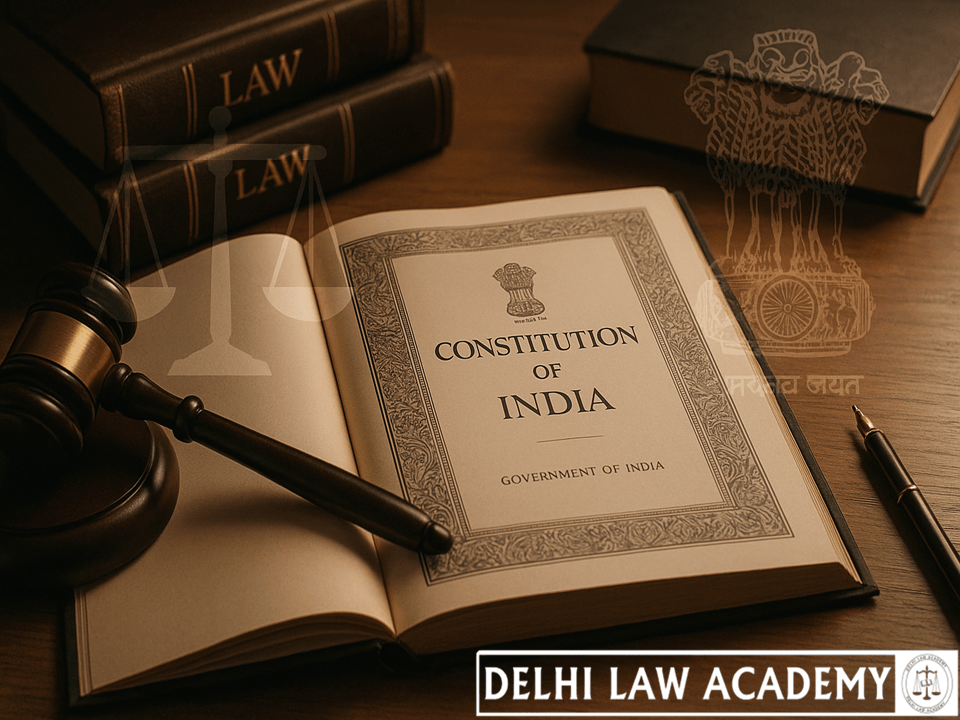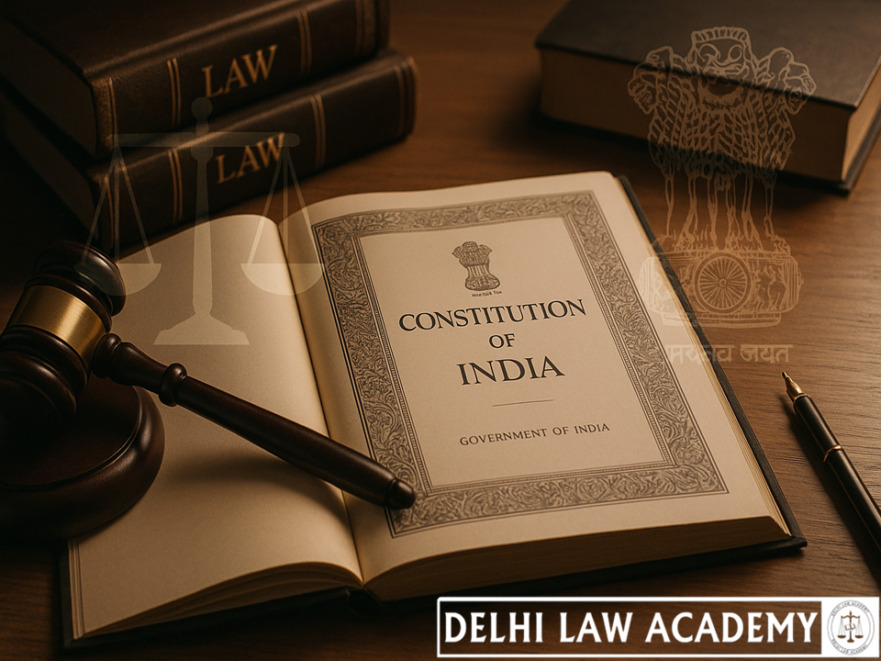
🏛️ Parliament (Articles 109 – 122) & Union Budget
Delhi Law Academy Jaipur — Comprehensive Notes for RJS, DJS & PCS(J) Judiciary Aspirants
💰 Money Bills — Article 109
- Money Bill can be introduced only in Lok Sabha.
- Rajya Sabha can only make recommendations after the Bill is passed by Lok Sabha.
- Lok Sabha may or may not accept these recommendations.
- Rajya Sabha has to return the Bill within 14 days; if not, the Bill is deemed passed by both Houses.
📘 Definition of Money Bills — Article 110
- A Bill is a Money Bill if it contains any of the following provisions only:
- Imposition, abolition or alteration of any tax
- Regulation of borrowing of money by Government of India
- Custody & withdrawal from Consolidated Fund of India (CFI)
- Appropriation of money out of CFI
- Declaration of expenditure as charged upon CFI
- A Bill is not a Money Bill if it provides for local taxes, fines or fees for licenses or services.
- Speaker’s Decision: Speaker of Lok Sabha decides if a Bill is a Money Bill; decision is final and certificate is endorsed before sending it to Rajya Sabha or President.
✍️ Assent to Bills — Article 111
- Bills passed by both Houses are sent to President for assent.
- President may give, withhold or return a Bill for reconsideration (except Money Bills).
- If passed again, President must give assent.
💼 Other Financial Bills — Article 117
- President’s recommendation is required to introduce any Bill containing matters in Article 110.
- Such Bills cannot be introduced in Rajya Sabha.
- No recommendation is needed for Bills reducing or abolishing taxes.
- President’s recommendation is also required for Bills involving expenditure from CFI before consideration by either House.
📜 Rules of Procedure — Article 118
- Each House frames its own rules for procedure and business.
- Rules for joint sittings are made by President after consulting Speaker and Chairman.
- Joint sittings are presided by the Speaker of Lok Sabha (or as per rules in his absence).
⏰ Financial Business — Article 119
- Parliament may by law regulate the conduct of financial business in each House to ensure timely completion.
🗣️ Language — Article 120
- Business in Parliament shall be transacted in Hindi or English.
- Presiding Officer may permit a member to speak in mother tongue if unable to express in Hindi or English.
- Use of English was to cease after 15 years unless Parliament otherwise provides by law.
🚫 Restriction on Discussion — Article 121
- No discussion in Parliament on the conduct of a Supreme Court or High Court judge except on a motion for his removal.
⚖️ Bar on Courts — Article 122
- Validity of Parliamentary proceedings cannot be questioned in courts for procedural irregularities.
- Officers or members exercising powers for procedure or order maintenance are not subject to court jurisdiction.
💵 UNION BUDGET — Articles 112 – 116
📊 Article 112 – Annual Financial Statement
- It is a statement of estimated receipts and expenditure of the Government of India for a financial year, laid before both Houses by the President.
- Expenditure is divided into:
- Expenditure charged upon the CFI
- Other expenditure proposed from the CFI
- Charged Expenditure includes: President and office expenses, judges’ salaries and pensions, CAG, debt charges, court order payments etc.
📋 Article 113 – Demands for Grants
- Charged expenditure may be discussed but not voted upon.
- Other expenditure is submitted to Lok Sabha as ‘demands for grants’ and requires the President’s recommendation.
- Lok Sabha may accept, refuse or reduce a demand.
🏦 Article 114 – Appropriation Bills
- Provides for appropriation out of CFI for grants and charged expenditure.
- No money can be withdrawn from CFI except by law passed under Article 114.
💡 Article 115 – Supplementary & Additional Grants
- Supplementary Grants: When authorized amount is insufficient for a service.
- Additional Grants: For new services arising during the year.
- Excess Grants: For amounts spent beyond the original grant.
⚙️ Article 116 – Votes on Account, Credit & Exceptional Grants
- Votes on Account: Advance grants for part of a financial year until Budget procedure is complete.
- Votes of Credit: For unexpected or urgent demands of indefinite character.
- Exceptional Grants: For non-recurring expenditure not part of the current service of the year.
📚 For more Constitution & Polity Notes, visit
Delhi Law Academy Jaipur
📘 Stay Ahead with Delhi Law Academy!
Get access to free monthly current affairs, read our insightful blogs,
and explore free study resources prepared by experts at DLA Jaipur. 🚀
❓ Frequently Asked Questions on Parliament & Union Budget
💰 What is a Money Bill under Article 110 of the Constitution?+
A Money Bill deals only with matters listed in Article 110 — such as taxation, borrowing by the Government of India, or expenditure from the Consolidated Fund of India. It can be introduced only in the Lok Sabha and the Speaker’s decision on whether a Bill is a Money Bill is final.
🏛️ What is the difference between a Money Bill and a Financial Bill?+
A Money Bill contains only provisions under Article 110 and can be introduced only in Lok Sabha with the Speaker’s certification. A Financial Bill, under Article 117, may include other provisions besides those in Article 110 and requires the President’s recommendation but can be introduced in either House.
📊 What is meant by the Annual Financial Statement under Article 112?+
The Annual Financial Statement, also called the Union Budget, is a yearly statement showing the estimated receipts and expenditures of the Government of India. It is presented by the President before both Houses of Parliament.
📋 What are Demands for Grants and who votes on them?+
Demands for Grants under Article 113 represent estimates of government expenditure from the Consolidated Fund of India. These are submitted to the Lok Sabha, which can approve, refuse, or reduce them. The Rajya Sabha only discusses them but does not vote.
🏦 What is an Appropriation Bill under Article 114?+
An Appropriation Bill authorizes the government to withdraw funds from the Consolidated Fund of India to meet the expenditure approved by the Lok Sabha. No money can be withdrawn without such approval by law.
⚙️ What are Votes on Account, Votes of Credit, and Exceptional Grants?+
Under Article 116, Votes on Account allow advance withdrawal for part of the financial year; Votes of Credit handle unforeseen expenditures of indefinite character; and Exceptional Grants cover non-recurring expenditures not part of the regular budget.
Contact us
📍 Delhi Law Academy – Jaipur Branch
6C, Tower 2, Coaching Hub, Pratap Nagar, Jaipur – 302033
📞 Phone:
+91 9911916552
+91 8447285606
✉️ Email:
contactus@delhilawacademy.com

